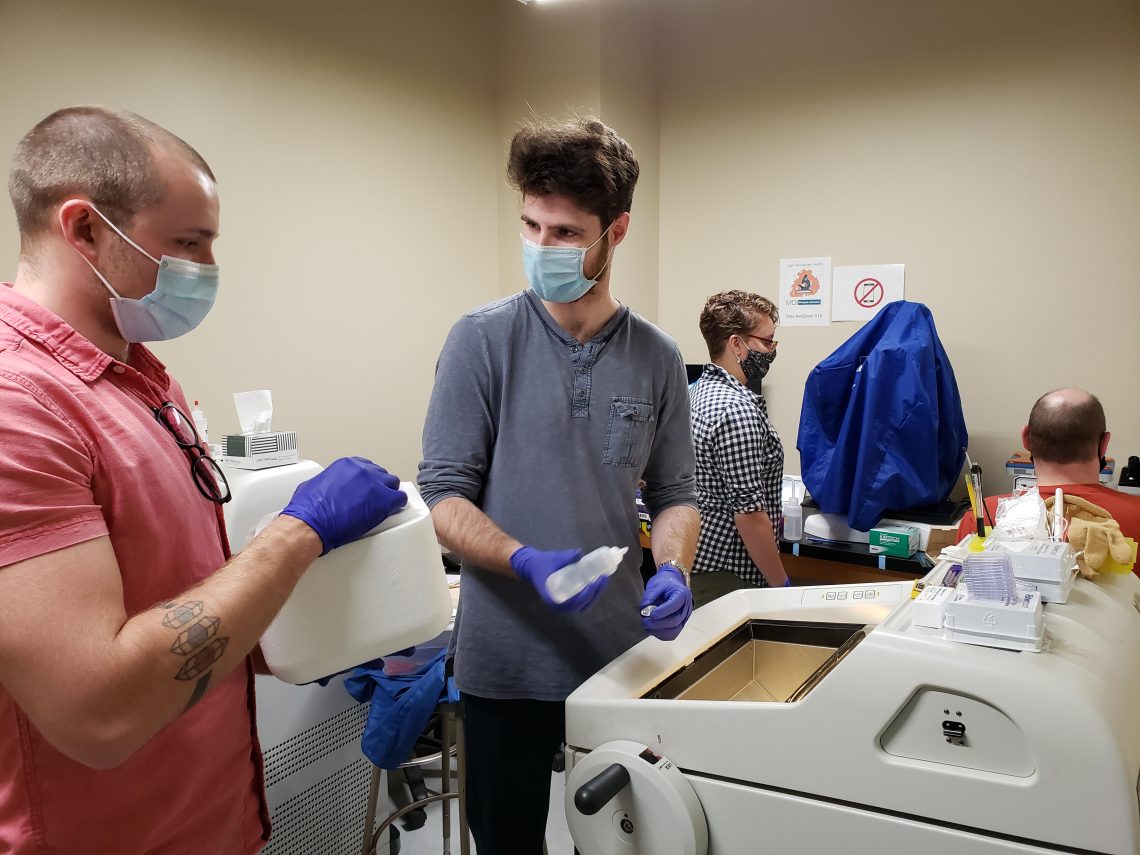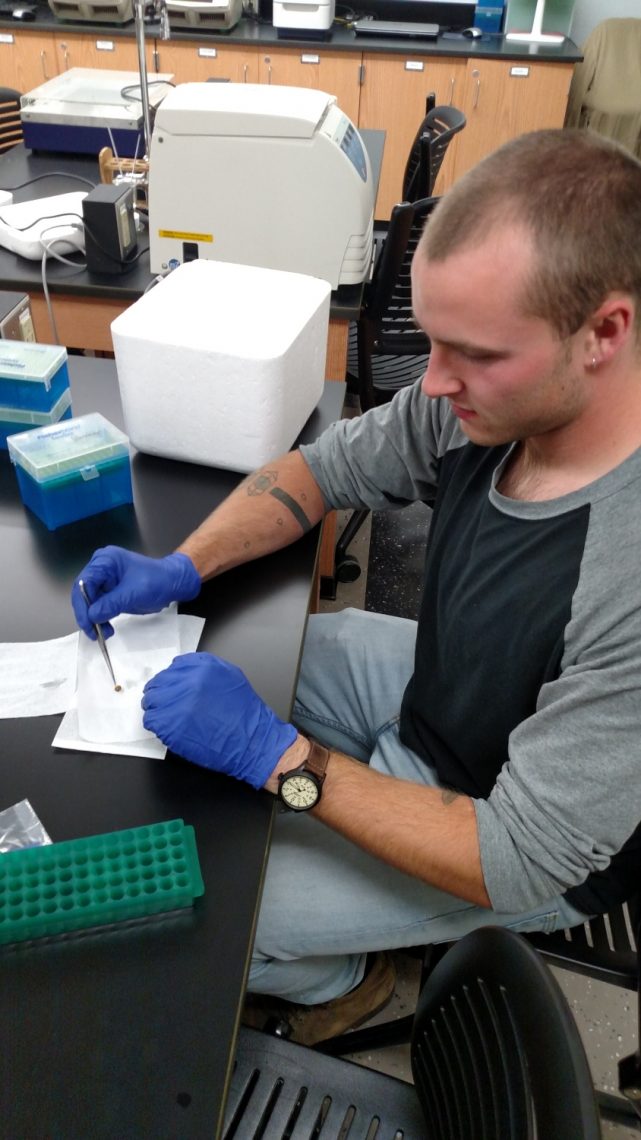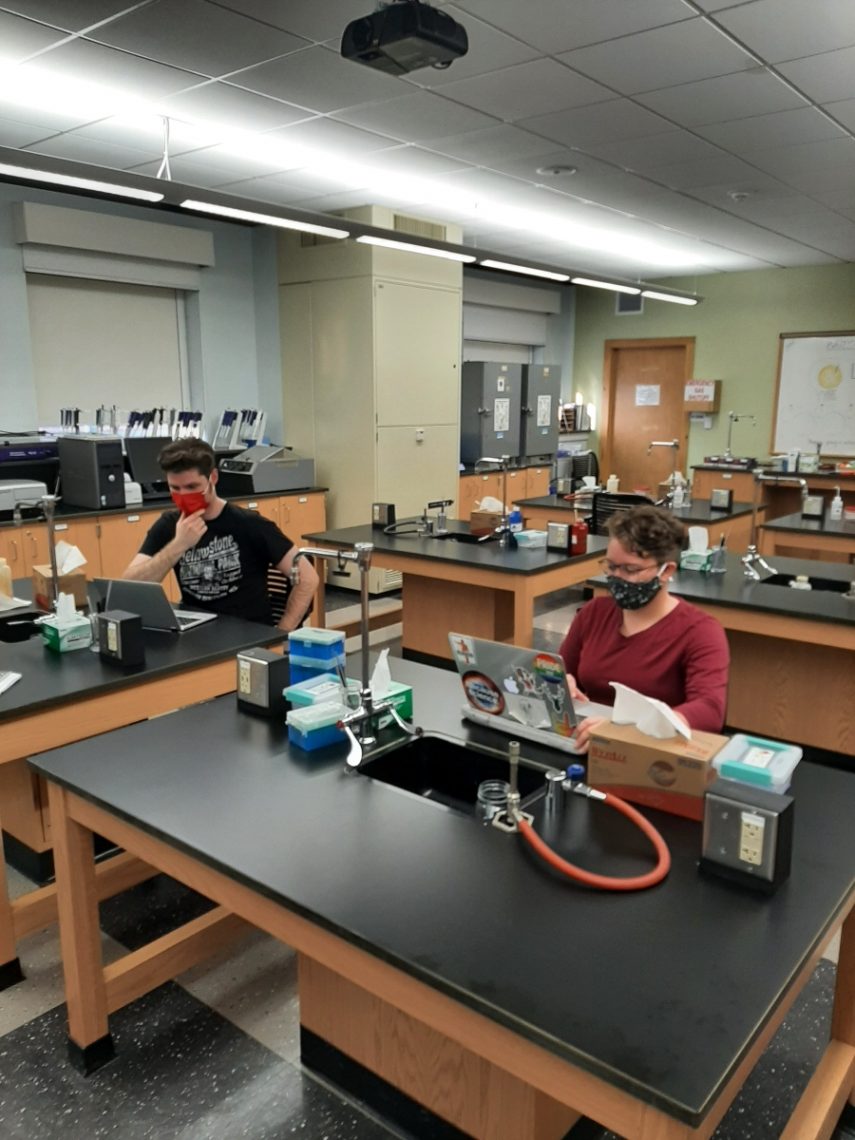FARMINGTON, ME (July 19, 2021)—The University of Maine at Farmington is excited to announce that a national research project led by Dr. Timothy Breton, UMF assistant professor of Biology, has discovered a new gene in fish that may have an impact on understanding several diseases found in humans, including diabetes, schizophrenia and autism spectrum disorder.

Dr. Timothy Breton, UMF assistant professor of Biology
The three-year research project recently published in the international journal Scientific Reports is funded by several grants totaling over $75,000 from the National Institutes of Health through the Maine IDeA Network of Biomedical Research Excellence (INBRE) and the MDI Biological Laboratory.

UMF students (left to right) William Sampson, Andrew Wilcox, and Anyssa Phaneuf work with UMF Biology faculty member Timothy Breton (far right) to process animal tissues for analysis on a recent trip to MDI Biological Laboratory.
The gene discovered by Breton and his team of student research assistants is a new member of a family of hormone receptors. Hormone receptors are found on the surface of every cell. They bind to hormones in the body, which causes a cell to do a new task.
Researchers discovered three genes in this family in 2000 and have been working to understand them. Breton’s discovery of the fourth gene may help shed light on how this particular family of hormone receptors works and potential biomedical uses.
“My team is very excited about this discovery,” said Breton. “Though our current research isn’t looking for a cure for these diseases, it gives scientists a better understanding of how these types of genes work across all vertebrates and hopefully can lead to promising biomedical applications in the future.”
The UMF study used DNA analysis to look at all animals that have these genes and found a fourth with the same DNA signature in a wide variety of fish species.

UMF student William Sampson prepares a fish tissue for DNA extraction in the Ricker Hall 220 laboratory.
“This new gene was hiding in plain sight,” said Breton, “but we needed to back up our conclusions with foundational research and hours in the lab and months of extensive computations.”
“The ‘aha moment’ happened in 2019 with myself and two UMF student researchers in the UMF science lab in Ricker Hall,” said Breton. “We realized that based on our computations we had actually discovered a brand new gene, and both students had the same exact reaction, ‘Wow! I can’t wait to tell my mother!’”
“This amazing discovery by Dr. Breton and his team of student research assistants shows the real-world importance of higher education research at UMF. We are so proud of his efforts and his team’s educational commitment and dedication to pursuing what has the potential to change the way scientists study this family of genes and their effect on human disease,” said Edward Serna, UMF president.
Four UMF students majoring in biology have participated in the UMF-led research project with grant-funded assistantships since 2019. These include: Anyssa Phaneuf, senior from Manchester, N.H.; William Sampson graduate of the class of 2021, from Windham; Tamera True graduate of the class of 2020, from Norridgewock and Andrew Wilcox graduate of the class of 2021, from Livermore Falls.
Phaneuf’s experience with Breton’s research helped her apply and get accepted into the Summer Honors Undergraduate Research Program (SHURP) at Harvard.

UMF students Andrew Wilcox (left) and Anyssa Phaneuf (right) conduct an analysis by computer in the Ricker Hall 220 laboratory.
“I just started working on this project this past year,” said Phaneuf. “I got to perform new lab techniques that aren’t taught in classes, and I got to learn about some of the behind-the-scenes parts of research that you don’t always think about as a student. Working on this even helped me with some of my coursework. I had better technique in my lab classes, I had a new perspective and better understanding of in-class projects, and it helped me improve my scientific writing and presentation skills.”
“Working on this project is actually one of the reasons I changed my career plans. I was originally planning on going to med school, but now I know that I want a career in research and so I will be pursuing a Ph.D. after graduating from UMF,” said Phaneuf.
In addition, Ilze Smidt from Bates and Benjamin Clifford from Southern Maine Community College were mentored by Breton in 2021 with Maine INBRE student summer research fellowships. Other researchers on the project included Taylor Lipscomb and Casey Murray who were graduate students from the University of Florida.
“When I started the project, Dr. Breton had already discovered the novel sreb3b gene, so naturally I was excited to get started,” said recent UMF graduate Sampson. “I’d never carried out genomics research, quantitative polymerase chain reactions, in situ hybridizations, or been involved in high level scientific writing. But I’ve had a lot of fun working in the Breton lab. I’ve been exposed to so much of the real process of research outside of the classroom. When I’m ready to apply to grad school, I have no doubt that my undergraduate research experience at UMF will give me a boost.”
Dr. Matthew DiMaggio assistant professor of Aquaculture at the Tropical Aquaculture Laboratory at the University of Florida was the major collaborator on the project. All participants are published co-authors of the professional journal article.
The third year of research funding started this summer and runs through spring 2022. Breton and his team will be working with Drs. DiMaggio and Chris Martyniuk, associate professor Dept. of Physiological Sciences, at the University of Florida to continue this work. This research should provide more insight into how the receptor family works in fish, and help inform future research in humans.
More on University of Maine at Farmington
A nationally-recognized liberal arts college known for its commitment to student success, UMF provides a challenging yet supportive environment to prepare students for both careers and further study. Rooted in a tradition of teacher preparation, UMF offers top quality programs in the arts and sciences, teacher preparation, and pre-professional studies. Located in the heart of Maine’s four-season outdoor recreational region, UMF is a welcoming, close-knit academic community that prepares students for engaged citizenship, enriching professional careers and an enduring love of learning.
# # #
Reporter contact: Dr. Timothy Breton, UMF assistant professor of biology, timothy.breton@maine.edu
EDITOR’S NOTE:
Link to image in WordPress: https://www.umf.maine.edu/wp-content/uploads/sites/1/2021/07/RP201-048A.jpg
Photo Caption: Dr. Timothy Breton, UMF assistant professor of Biology
Photo Credit: UMF Photo
Link to image in WordPress: https://www.umf.maine.edu/wp-content/uploads/sites/1/2021/07/RP201-048B.jpg
Photo Caption: UMF student William Sampson prepares a fish tissue for DNA extraction in the Ricker Hall 220 laboratory.
Photo Credit: UMF image
Link to image in WordPress: https://www.umf.maine.edu/wp-content/uploads/sites/1/2021/07/RP201-048C.jpg
Photo Caption: UMF students Andrew Wilcox (left) and Anyssa Phaneuf (right) conduct an analysis by computer in the Ricker Hall 220 laboratory.
Photo Credit: UMF image
Link to image in WordPress: https://www.umf.maine.edu/wp-content/uploads/sites/1/2021/07/RP201-048D.jpg
Photo Caption: UMF students (left to right) William Sampson, Andrew Wilcox, and Anyssa Phaneuf work with UMF Biology faculty member Timothy Breton (far right) to process animal tissues for analysis on a recent trip to MDI Biological Laboratory.
Photo Credit: Dustin Updike, MDI Biological Laboratory.

